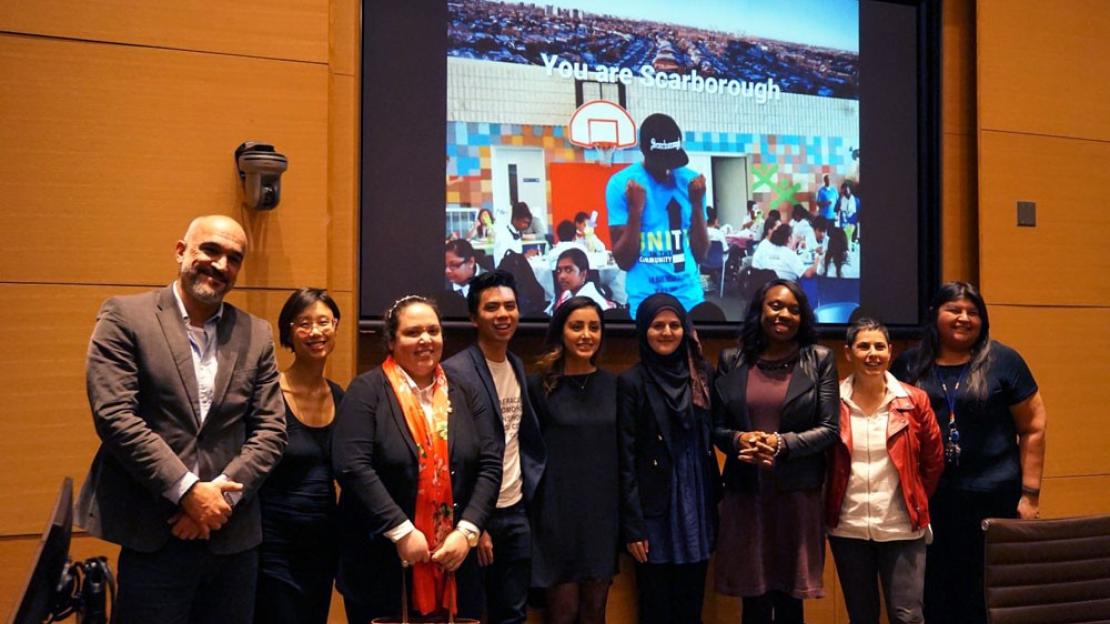Scarborough is a unique place. But is it worthy of its own academic program?
Based on a recent symposium on campus, the chances are looking pretty good.
U of T Scarborough held a Scarborough Studies Symposium February 1, the first in a series focused on the critical study of Scarborough.
Scarborough Studies was created and hosted by two alumni, Niyosha Keyzad, a course instructor at the English Department, and Felix Chu, working in public policy.
“The genesis of this comes from reading the novel Scarborough [by Catherine Hernandez],” said Chu. “I remembered how growing up in Scarborough gives you a different set of values from a lot of people who grew up in other parts of the city. Values of solidarity, values of being kind to each other, empathy.”
Chu suggested to Keyzad that she also read the book, which became the subject of her Critical Writing About Literature course last fall. The course examines one piece of literature through different forms of analysis.
“The students understood the implications of this work of fiction because the novel represents them and their world, even if it doesn’t reflect their personal experiences,” said Keyzad. She described the experience as “one of the most intense and fulfilling” times in her teaching career.
Keyzad invited one student from her course to speak about the novel and its relation to the community. Sadiah Khan, a third year majoring in Biology minoring in English Literature and Psychology, read a piece about the theme of female empowerment in the novel.
One of the most passionate speeches came from Ahmed Allahwala, an associate professor, teaching stream of City Studies, who declared the event as “probably the most meaningful event that I’ve attended at this campus.” Allahwala said he felt moved by his fellow speakers and had to hold back tears as everyone spoke about their home.
“My hope is that Scarborough Studies will not so much be concerned with the particular content of study, but much rather be a methodological stance and a value disposition,” said Allahwala. “A deliberate attempt to be an inclusive space for collaborative meaning making about this place we call home, this place we call Scarborough.”
The event also featured a series of Lightning Talks during which members of the community were given the opportunity to present their works that focus on Scarborough.
Local author and U of T Scarborough alumni Nastasha Ramoutar spoke about her personal anguish when trying to find positive representations of her home in George Elliot Clark’s Toronto Poetry Map.
“When I searched through the east end of the map, I found that Scarborough appeared often only as a description of the bluffs and nature, or as violent altercations,” said Ramoutar. “This Scarborough didn’t correlate with my vision of home.”
Many speakers expressed frustration with poor transit in the area, which exacerbates negative stereotypes about Scarborough. Keynote speaker Mitzie Hunter, a U of T Scarborough alum and Ontario Minister of Advanced Education and Skills Development spoke about her own struggles trying to get to work downtown from the Scarborough campus. From the issues with freezing RT lines to overly packed express buses, transit issues appeared to be a constant burden for Scarborough residents.
Keyzad says the event is just the beginning of a series that will be interdisciplinary, intergenerational and accessible to the community. “This place is really special,” she told attendees. “Those of you who are here know that already, and if you’re not yet convinced, you’ll see.”
The next Scarborough Studies Series event will be Thursday March 29th at 7 PM. In partnership with SELF (Students of English Literature and Film) they will be screening the film ‘Wexford Plaza’ (2016) which will be followed by a Q&A with the film’s director/writer, Joyce Wong.
You can find more information about Scarborough Studies on their Facebook page.
